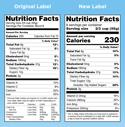Brands
Maker Of Costco-Sold Veggie Burgers Switches To New Plant-Based Formula
 California-based Don Lee Farms announced it is switching to a new all plant-based formula in its popular organic veggie burgers and veggie bites sold at Costco. The plant-based ingredients include organic veggies and organic sunflower seeds. The new formula-burgers will be gluten-free, vegan, plant-based, GMO-free, free from artificial ingredients and organic certified, the company said. The plant-based burgers resemble beef patties but "bleed" organic beet juice and sizzle on the grill from organic vegetable-based fats. The company recently announced it was launching its organic plant-based burger in nearly 2,000 Kroger stores, an expansion of its distribution to more than 8,000 retail markets, including Whole Foods Markets, Walmart, and Publix.[Image Credit: © Don Lee Farms]
California-based Don Lee Farms announced it is switching to a new all plant-based formula in its popular organic veggie burgers and veggie bites sold at Costco. The plant-based ingredients include organic veggies and organic sunflower seeds. The new formula-burgers will be gluten-free, vegan, plant-based, GMO-free, free from artificial ingredients and organic certified, the company said. The plant-based burgers resemble beef patties but "bleed" organic beet juice and sizzle on the grill from organic vegetable-based fats. The company recently announced it was launching its organic plant-based burger in nearly 2,000 Kroger stores, an expansion of its distribution to more than 8,000 retail markets, including Whole Foods Markets, Walmart, and Publix.[Image Credit: © Don Lee Farms]
Companies
Perdue Expands Processing Operations In S.C. To Meet No-Antibiotics Demand
 Privately-owned poultry processor Perdue Farms has spent $25 million on expanding its operations in South Carolina to satisfy consumer demand for antibiotics-free chicken. The company enlarged its portioning and marinating facilities, added a shipping cooler, and added installed automated pallet storage and office space. According to Perdue, all chicken, turkey, pork, and beef are now raised in antibiotics-free environments. It also offers a full range of no-antibiotics-ever products for foodservice operators, including restaurants, schools, colleges and universities, and hospitals. "The expansion will help us meet the growing demand for no-antibiotics-ever chicken products, and maintain the high level of customer service and reliability” expected from Perdue, CEO Randy Day said.[Image Credit: © Perdue and its affiliates or subsidiaries]
Privately-owned poultry processor Perdue Farms has spent $25 million on expanding its operations in South Carolina to satisfy consumer demand for antibiotics-free chicken. The company enlarged its portioning and marinating facilities, added a shipping cooler, and added installed automated pallet storage and office space. According to Perdue, all chicken, turkey, pork, and beef are now raised in antibiotics-free environments. It also offers a full range of no-antibiotics-ever products for foodservice operators, including restaurants, schools, colleges and universities, and hospitals. "The expansion will help us meet the growing demand for no-antibiotics-ever chicken products, and maintain the high level of customer service and reliability” expected from Perdue, CEO Randy Day said.[Image Credit: © Perdue and its affiliates or subsidiaries]
Hormel Launches National Ad Campaign To Inspire People To “Choose Good”
 Austin, Minn.-based Hormel, maker of Natural Choice deli meats, has launched the “Good Feeds Us All” national advertising campaign to “inspire people to choose good whether it's in the food they eat or the actions they take.” The brand will incorporate a Good Feeds Us All national tour to spotlight individuals and organizations who have made it their mission to choose good. However, whether Natural Choice meats are really natural or good has spawned litigation. The D.C. Superior Court on April 8 dismissed a lawsuit by the Animal Legal Defense Fund (ALDF) alleging Hormel was misleading consumers. But in statements disclosed in the court filing, a Hormel executive said the same antibiotics-treated pigs used to make its Spam meat product are also used in Natural Choice pork products. An ALDF attorney said Hormel was engaged in “a massive attempt to manipulate and dupe the consumer to purchase something they have no intention to purchase.”[Image Credit: © Lloyd's Barbeque Company, LLC]
Austin, Minn.-based Hormel, maker of Natural Choice deli meats, has launched the “Good Feeds Us All” national advertising campaign to “inspire people to choose good whether it's in the food they eat or the actions they take.” The brand will incorporate a Good Feeds Us All national tour to spotlight individuals and organizations who have made it their mission to choose good. However, whether Natural Choice meats are really natural or good has spawned litigation. The D.C. Superior Court on April 8 dismissed a lawsuit by the Animal Legal Defense Fund (ALDF) alleging Hormel was misleading consumers. But in statements disclosed in the court filing, a Hormel executive said the same antibiotics-treated pigs used to make its Spam meat product are also used in Natural Choice pork products. An ALDF attorney said Hormel was engaged in “a massive attempt to manipulate and dupe the consumer to purchase something they have no intention to purchase.”[Image Credit: © Lloyd's Barbeque Company, LLC]
Naturally Network Spreads Good Food Movement To Chicago
 Chicago's Good Food movement is linking with the Naturally Network, a natural and organic foods and economic development initiative, to build a diverse food community “within the Chicago foodshed and beyond.” Naturally Chicago follows the Naturally Boulder initiative in Colorado, which organized in 2005 and now has 1,400 natural product members. An affiliate in the Bay Area in California was launched last year. Naturally Boulder was started to help retain the natural and organic food businesses that had started in the region. Connecting people created a thriving ecosystem for entrepreneurs and others in the “good food movement” – local and fresh food produced in a sustainable manner – to come together, organizers said.[Image Credit: © Naturally Chicago]
Chicago's Good Food movement is linking with the Naturally Network, a natural and organic foods and economic development initiative, to build a diverse food community “within the Chicago foodshed and beyond.” Naturally Chicago follows the Naturally Boulder initiative in Colorado, which organized in 2005 and now has 1,400 natural product members. An affiliate in the Bay Area in California was launched last year. Naturally Boulder was started to help retain the natural and organic food businesses that had started in the region. Connecting people created a thriving ecosystem for entrepreneurs and others in the “good food movement” – local and fresh food produced in a sustainable manner – to come together, organizers said.[Image Credit: © Naturally Chicago]
Company Provides DNA Trace Back System To Assure Origins Of U.S. Food
Consumers
Rebellious Energy Of Teenagers Used To Change Attitudes Toward Junk Food
 Research published in the journal Nature Human Behavior urges exposing naturally rebellious teenagers to the food industry’s manipulative marketing techniques to get them to rebel against the devious snack makers contributing to teen obesity. Teenagers can have “powerful feelings of outrage,” one researcher noted, that can be harnessed to promote public health. For the study, researchers designed an intervention in eighth grade classrooms in a Texas middle school, issuing a fact-based, exposé-style article on big food companies to the students. A control group was shown traditional healthy eating education material. The group that read the exposés chose fewer junk food snacks and selected water over sugary sodas the next day. However, the researchers puzzled over why girls who experienced a negative immediate response to junk food after the intervention didn’t really change their daily cafeteria purchases.[Image Credit: © skeeze from Pixabay]
Research published in the journal Nature Human Behavior urges exposing naturally rebellious teenagers to the food industry’s manipulative marketing techniques to get them to rebel against the devious snack makers contributing to teen obesity. Teenagers can have “powerful feelings of outrage,” one researcher noted, that can be harnessed to promote public health. For the study, researchers designed an intervention in eighth grade classrooms in a Texas middle school, issuing a fact-based, exposé-style article on big food companies to the students. A control group was shown traditional healthy eating education material. The group that read the exposés chose fewer junk food snacks and selected water over sugary sodas the next day. However, the researchers puzzled over why girls who experienced a negative immediate response to junk food after the intervention didn’t really change their daily cafeteria purchases.[Image Credit: © skeeze from Pixabay]
Other
“Natural” Or Not, Use Of Low-Calorie Sweeteners Should Be Limited
 As consumers seek to cut down on sugar intake while enjoying a little sweetness, sales of “natural” plant-based sweeteners like monk fruit and stevia are booming, while sales of artificial sweeteners are plummeting. Stevia sales grew 11.9 percent between 2017 and 2018, while artificial sweetener sales slid 6.6 percent. Several studies have highlighted the health benefits – or lack of harmful effects – of using natural sweeteners. But the big question is: Do they help people lose weight? So far, the evidence doesn't support that idea. Are stevia and monk fruit better because they're natural? Remember that "natural" doesn't automatically mean "better." For example, whole stevia leaves and less purified stevia extracts aren't approved for use in food because of concerns related to kidney health. Dietician Christy Brissette says consumers should try to limit the use of low-calorie sweeteners to help taste buds adapt to less sweetness over time. And nutritious foods such as fruit provide fiber and nutrients along with natural sugars.[Image Credit: © Tafilah Yusof from Pixabay]
As consumers seek to cut down on sugar intake while enjoying a little sweetness, sales of “natural” plant-based sweeteners like monk fruit and stevia are booming, while sales of artificial sweeteners are plummeting. Stevia sales grew 11.9 percent between 2017 and 2018, while artificial sweetener sales slid 6.6 percent. Several studies have highlighted the health benefits – or lack of harmful effects – of using natural sweeteners. But the big question is: Do they help people lose weight? So far, the evidence doesn't support that idea. Are stevia and monk fruit better because they're natural? Remember that "natural" doesn't automatically mean "better." For example, whole stevia leaves and less purified stevia extracts aren't approved for use in food because of concerns related to kidney health. Dietician Christy Brissette says consumers should try to limit the use of low-calorie sweeteners to help taste buds adapt to less sweetness over time. And nutritious foods such as fruit provide fiber and nutrients along with natural sugars.[Image Credit: © Tafilah Yusof from Pixabay]
Regulation
Suit Alleges “False Advertising” As Panera Launches “Clean Label” Campaign
 Panera Bread’s advertising campaign touting the restaurant as a place to “eat clean” is “false advertising,” a new class action lawsuit filed in a California federal court alleges. Panera's new ad campaign – featuring in-store advertisements, bags, signs and labels, and an “earthy” green and brown color scheme – promotes its food as “clean” and “100 percent clean,” but the food actually contains glyphosate, the main ingredient in the herbicide Roundup (Monsanto). The restaurant chain, jumping on the “clean-eating bandwagon,” “is deceiving consumers into believing that [its] products are of a higher quality, free from synthetic chemicals, or free from chemical residues from the production process when they are not.” The suit alleges violations of the state's Unfair Competition Law, False Advertising Law, and Consumer Legal Remedies Act, seeking monetary damages as well as a halt to the allegedly deceptive advertising. [Image Credit: © Panera Bread]
Panera Bread’s advertising campaign touting the restaurant as a place to “eat clean” is “false advertising,” a new class action lawsuit filed in a California federal court alleges. Panera's new ad campaign – featuring in-store advertisements, bags, signs and labels, and an “earthy” green and brown color scheme – promotes its food as “clean” and “100 percent clean,” but the food actually contains glyphosate, the main ingredient in the herbicide Roundup (Monsanto). The restaurant chain, jumping on the “clean-eating bandwagon,” “is deceiving consumers into believing that [its] products are of a higher quality, free from synthetic chemicals, or free from chemical residues from the production process when they are not.” The suit alleges violations of the state's Unfair Competition Law, False Advertising Law, and Consumer Legal Remedies Act, seeking monetary damages as well as a halt to the allegedly deceptive advertising. [Image Credit: © Panera Bread]
Research & Insights
FDA Food Label Changes Could Prevent A Million Cases Of Heart-Related Disease
 A modeling study published in the journal Circulation (American Heart Assoc.) reports that pending changes to the FDA’s Nutrition Facts label that will require products to clearly label the grams and percent Daily Value of added sugar could prevent or postpone nearly a million cases of cardiometabolic disease and save billions in healthcare and societal costs over the next 20 years. If manufacturers as expected also reformulate their products to reduce added sugars they would need to label, it would triple the cardiovascular disease and diabetes cases prevented during the same time period. By 2037, the label change alone could prevent 354,400 cardiovascular disease cases and 599,300 cases of diabetes – equal to an additional 727,000 years of life and a savings of $31 billion in healthcare costs or $61.9 billion in societal costs,[Image Credit: © U.S. Food and Drug Administration]
A modeling study published in the journal Circulation (American Heart Assoc.) reports that pending changes to the FDA’s Nutrition Facts label that will require products to clearly label the grams and percent Daily Value of added sugar could prevent or postpone nearly a million cases of cardiometabolic disease and save billions in healthcare and societal costs over the next 20 years. If manufacturers as expected also reformulate their products to reduce added sugars they would need to label, it would triple the cardiovascular disease and diabetes cases prevented during the same time period. By 2037, the label change alone could prevent 354,400 cardiovascular disease cases and 599,300 cases of diabetes – equal to an additional 727,000 years of life and a savings of $31 billion in healthcare costs or $61.9 billion in societal costs,[Image Credit: © U.S. Food and Drug Administration]
History Of Eating Disorders Predisposes People To "Clean Eating" Obsession
 Researchers at York University's Faculty of Health (U.K.) say those who have a history of an eating disorder, obsessive-compulsive traits, dieting, poor body image, and a drive for thinness are more likely to develop a pathological obsession with healthy eating or consuming only healthy food, known as orthorexia nervosa (ON). Although eating healthy is an important part of a healthy lifestyle, for some people this preoccupation with healthy eating can become physically and socially impairing. The researchers reviewed studies published through the end of 2018 in two databases to determine the psychosocial risk factors associated with orthorexia nervosa. "When taken to the extreme, an obsession with clean eating can be a sign that the person is struggling to manage their mental health," they concluded (McComb et al., Appetite 2019)[Image Credit: © RitaE from Pixabay]
Researchers at York University's Faculty of Health (U.K.) say those who have a history of an eating disorder, obsessive-compulsive traits, dieting, poor body image, and a drive for thinness are more likely to develop a pathological obsession with healthy eating or consuming only healthy food, known as orthorexia nervosa (ON). Although eating healthy is an important part of a healthy lifestyle, for some people this preoccupation with healthy eating can become physically and socially impairing. The researchers reviewed studies published through the end of 2018 in two databases to determine the psychosocial risk factors associated with orthorexia nervosa. "When taken to the extreme, an obsession with clean eating can be a sign that the person is struggling to manage their mental health," they concluded (McComb et al., Appetite 2019)[Image Credit: © RitaE from Pixabay]
Copyright 2026 Business360, Inc.

